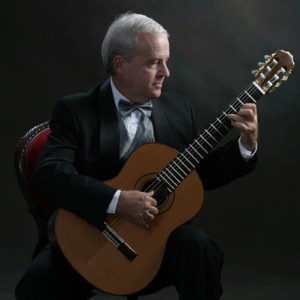
Society spreads the gospel of classical guitar
There’s more to the guitar – or maybe that should be “less” – than what you can get out of plugging one into a stack of Marshalls.
That’s the electric guitar, and it has its own important, if relatively brief, history. The original instrument, though, is centuries old, and since 1988, Carlos Molina has been carrying the flag for the literature and the tradition of the classical guitar.
“It’s a very cultivated art in the sense that we cover all the epochs, from the vihuela [an early version of the guitar] in the 16th century to the most contemporary pieces,” he said. “So we have a very vast repertoire.”
The Miami Classical Guitar Society last month was named one of 57 finalists for a grant from the Knight Arts Challenge for a project involving educational outreach. Winners of the awards will be announced in December.
Molina said the society would use the money to bring programs to all six campuses of Miami-Dade College, where Molina has taught for 29 years. Society members would also be making visits to area high schools such as Ferguson High, where one of Molina’s former students, Horby Lopez, operates what he calls “a great program” with 150 young guitarists.
“We’re going to go to them to promote our society, that’s one of the main reasons, and to have them be motivated by our art,” Molina said. “It’s a very selective art … Kids want to play rock and jazz and those sorts of things. And classical is a different thing. But one thing I can assure you: They like it.”
Over the years, the society has offered a number of different gatherings of musicians. In 1991, it organized the Guitar Festival of the Americas at Florida International University, and in 1996, the Los Angeles Guitar Quartet was the featured ensemble at the society’s first Guitar Ensemble Festival.
In 2002, it was the Sun Waves Guitar Fest, which the society says was attended by 317 guitarists, and in the next two years it hosted workshops and a guitar competition.
Molina is a native of Cuba, where he studied at the National Conservatory of Music with the legendary Isaac Nicola. He began touring internationally in 1970 after winning the National Guitar Competition in Cuba, and headed the guitar department at the Superior Institute of the Arts. He came to the United States in December 1982, where in addition to his work at Miami-Dade College he taught for 11 years at Florida International University.
“I love teaching,” he said, and he’s taught a wide variety of guitarists over the past three decades, including Carlos Rafael Rivera, whose trumpet concerto for Arturo Sandoval was premiered by the trumpeter and the Miami Symphony Orchestra a couple years back.
This past season, the society presented three concerts featuring young rising classical guitarist – Sweden’s Johannes Möller, Damien Lancelle of France and Paraguay’s Berta Rojas – as well as Molina himself, in concert with his wife Marisa, a soprano. (A fifth guitarist had to cancel because of illness.) This coming season, Molina said, there will be seven concerts.
“This season, we’re going to make a special effort to bring the very, very best,” Molina said. “We’ve done that before, but this season is going to be special.”
On tap for the upcoming season are the French guitarist and composer Roland Dyens, the Scottish-born master David Russell, and Sergio and Odair Assad, the well-known guitar duo from Brazil. A fourth concert featuring an established player is still in the works, Molina said.
The younger players on the series include Vladimir Gorbach, a Russian who won the Guitar Foundation of America contest last year; Mexico’s Alejandro Cordova, winner of the 2011 Coria International Guitar Festival competition in Spain; and Cristina Perez, a Colombian guitarist and winner of a recent New England Conservatory contest.
“They are very young, and they are super,” Molina said.
The major goal of the society today is to resume the hosting of an international guitar competition. The last one the society presented was in 2007, but since then, the global financial crisis has dried up sponsorship funding, he said. But winning the grant would help the group pay for a competition next summer that would feature concerts by three guitarists and educational programs as well as the contest itself, he said.
It’s all a way of advancing an art Molina says attracts many more young people than you might think, and the results are always rewarding.
“They come to me from rock or jazz and they want to hear something new, and when they see what they are able to do, they really enjoy it,” he said. “The beginning is always hard, because they’re used to the noise, and the blasting, and all that stuff … But once they get into playing one of the little studies or the pieces that have a melody or a chord and accompaniment together, they’re surprised.”
Recent Content
-
Artsarticle ·
-
Artsarticle ·
-
Artsarticle ·

